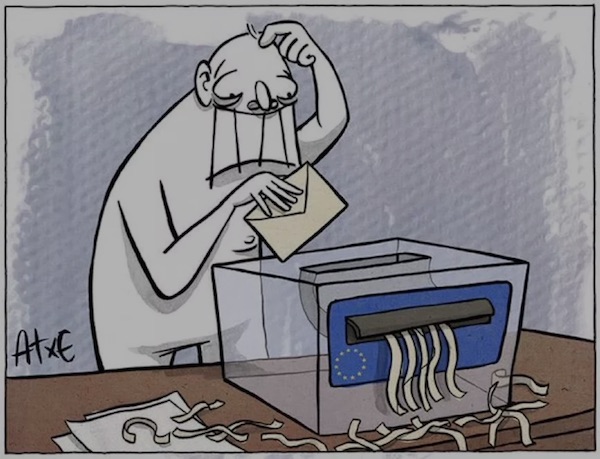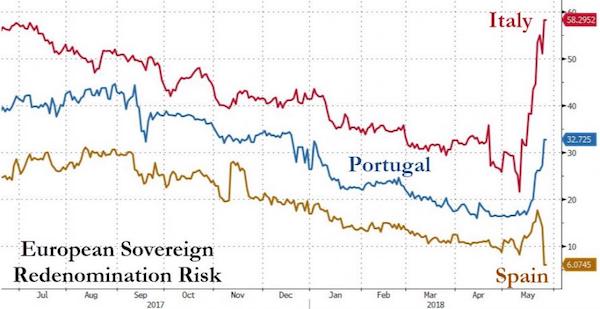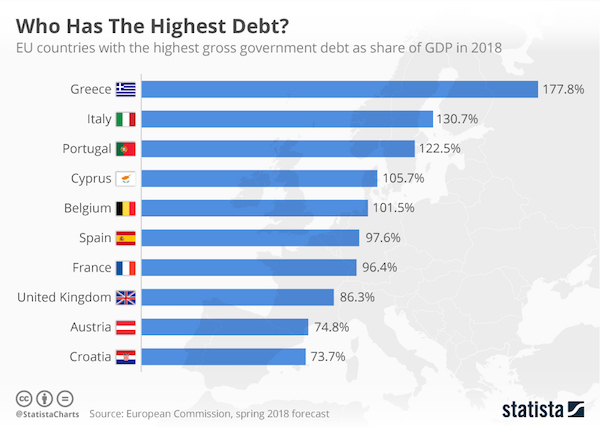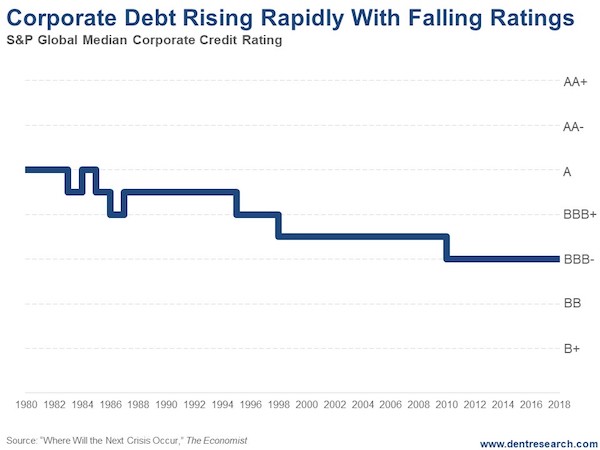
Henri Matisse The painter and his model 1916-17

“Real estate investment accounts for about two-thirds of Chinese household assets..”
• China’s Biggest Risk May Be Its Property Market – Not The Trade War (CNBC)
China’s hot real estate market remains a challenge for authorities trying to maintain stable economic growth in the face of trade tensions with the U.S. In fact, property is the country’s biggest risk in the next 12 months, much greater than the trade war, according to Larry Hu, head of greater China economics at Macquarie. He said he is especially watching whether the real estate market in lower-tier, or smaller, cities will see a downturn in prices or housing starts after recent sharp increases. Real estate investment accounts for about two-thirds of Chinese household assets, according to wealth manager Noah Holdings. The property market also plays a significant role in local government revenues, bank loans and corporate investment.
As a result, a sharp slowdown in the real estate market’s growth and drop in prices would have a negative affect on overall economic growth. So far, the market has been hot: The average selling price for newly built non-governmental housing in 60 tier-three and tier-four cities tracked by Tospur Real Estate Consulting rose 28.1 percent from January 2016 to May 2018. [..] Last week, Nanjing, a tier-two city, announced a ban on corporate purchases of residential properties, following similar moves to limit speculation by Shanghai and some other cities. That’s a good move for controlling risk, according to Joe Zhou, real estate and investment management firm JLL’s regional director for China capital markets. He said the government is not likely to loosen its policy soon and that prices could decline on average.
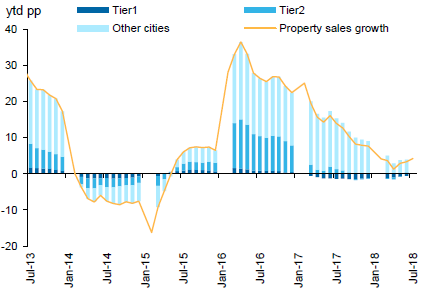

“The reliance of tech firms on venture capital and bubble psychology, rather than cash flow..”
• Why Do American CEOs Get Paid So Much? (Galbraith)
A new report from the Economic Policy Institute calls attention to the hardy perennial of how much America’s corporate titans make: bosses of the top 350 firms made an average of $18.9m in 2017. That’s a ratio of 312-1 over the median worker in their industries. Big bucks to be sure. And a big change since 1965, when the ratio was just 20-1. But what does it mean? And if there’s a problem, what is it, exactly? What it means, as the EPI economists carefully document, is that the top US corporate chiefs are paid overwhelmingly with stock options, and their income fluctuates with the market. About 80% of the pay packet is in stocks, and the rise of 17% in 2017 after two flat years surely suggests that the top CEOs (not unreasonably) sensed the market peaked last year.
So they cashed in. On the other 20% of the pay packets, no gains occurred. The US numbers have shock value. But bear in mind that they reflect not only the way companies are run, but also changes over decades in the structure of the US economy and tax law, specifically the rise of market valuations in technology and finance at the expense of the major industrial corporations, and a corresponding decline in unions, which held down the ratios in the sectors the industrial firms dominated a half century back. Plus, there is the radical decline in top marginal tax rates on income and capital gains, beginning in 1978, which gave executives strong reasons to restructure their pay away from inside-the-corporation perks (the penthouses and country clubs of yore) and toward cash and capital assets.
The reliance of tech firms on venture capital and bubble psychology, rather than cash flow, deepened this trend. Note also that there is something a bit artificial about the resulting “wealth.” Jeff Bezos may have a net worth of over $150bn, mostly in Amazon stock, but he couldn’t convert it into cash if he wanted to, neither by selling nor by borrowing. Any effort to sell would demolish Amazon’s valuation and hence his own fortune. The rich aren’t like us – they have more money, true, but some of it isn’t really money and it can disappear, by the billions, pretty fast.

As I wrote yesterday, this will have to change.
• Trump Says It Is ‘Dangerous’ For Twitter, Facebook To Ban Accounts (R.)
U.S. President Donald Trump said on Monday that it is “very dangerous” for social media companies like Twitter and Facebook to silence voices on their services. Trump’s comments in an interview with Reuters come as the social media industry faces mounting scrutiny from Congress to police foreign propaganda. Trump has made his Twitter account – with more than 53 million followers – an integral and controversial part of his presidency, using it to promote his agenda, announce policy and attack critics. Trump previously criticized the social media industry on Aug. 18, claiming without evidence in a series of tweets that unnamed companies were “totally discriminating against Republican/Conservative voices.”
In the same post, Trump said “too many voices are being destroyed, some good & some bad.” Those tweets followed actions taken by Apple, Alphabet, YouTube and Facebook to remove some content posted by Infowars, a website run by conspiracy theorist Alex Jones. Jones’ own Twitter account was temporarily suspended on Aug. 15. “I won’t mention names but when they take certain people off of Twitter or Facebook and they’re making that decision, that is really a dangerous thing because that could be you tomorrow,” said Trump.

Also mentioned yesterday. Chances of a sitdown in the next 10 days don’t look good.
• Trump Worries That Mueller Interview Could Be A ‘Perjury Trap’ (R.)
U.S. President Donald Trump said on Monday he was worried that any statements under oath he provides to Special Counsel Robert Mueller could be used to bring perjury charges against him as part of the probe into Russia’s electoral interference. In an interview with Reuters, Trump echoed the concerns of his top lawyer in the probe, Rudy Giuliani, who has warned that any sit-down with Mueller could be a “perjury trap.” The president expressed fears that investigators could compare his statements with that of others who have testified in the probe, such as former FBI Director James Comey, and that any discrepancies could be used against him.
“So if I say something and he (Comey) says something, and it’s my word against his, and he’s best friends with Mueller, so Mueller might say: ‘Well, I believe Comey,’ and even if I’m telling the truth, that makes me a liar. That’s no good.” Despite his concerns, Trump did not comment on whether he would ultimately agree to an interview with Mueller, who is, among other things, investigating whether Trump’s campaign team colluded with Russians during the 2016 election and whether Trump has obstructed justice in the probe. Trump also declined to say whether he might strip Mueller of his security clearance, as he did last week to former CIA Director John Brennan, who had repeatedly criticized Trump’s handling of foreign policy and national security issues.
“I haven’t given it a lot of thought,” he said. [..] Trump asserted that he retained the power to intervene in the probe, but that he had chosen not to do so for the moment. His administration, Trump said, was “a smooth-running machine, except in that world. And I’ve decided to stay out. Now I don’t have to stay out. “I can go in, and I could do whatever — I could run it if I want. But I decided to stay out,” he said. “I’m totally allowed to be involved if I wanted to be. So far, I haven’t chosen to be involved. I’ll stay out.”

Whatever the predictable comments on this, what he really does is confirm the Fed’s independence.
• Trump Demands Fed Help On Economy, Complains About Interest Rate Rises (R.)
U.S. President Donald Trump said on Monday he was “not thrilled” with the Federal Reserve under his own appointee, Chairman Jerome Powell, for raising interest rates and said the U.S. central bank should do more to help him to boost the economy. In the middle of international trade disputes, Trump in an interview with Reuters also accused China and Europe of manipulating their respective currencies. American presidents have rarely criticized the Fed in recent decades because its independence has been seen as important for economic stability.
Trump has departed from this past practice and said he would not shy from future criticism should the Fed keep lifting rates. The president spooked investors in July when he criticized the U.S. central bank’s over tightening monetary policy. On Monday he said the Fed should be more accommodating on interest rates. “I’m not thrilled with his raising of interest rates, no. I’m not thrilled,” Trump said, referring to Powell.

Nobody Hunt goes to Washington with veiled criticism of Trump. Good luck with that.
• UK’s Hunt To Call On Trump To Impose Fresh Sanctions On Russia (G.)
The British foreign secretary, Jeremy Hunt, is to urge Donald Trump to face down Moscow’s threat to western values by imposing wider economic sanctions against Russia and agreeing new rules to protect the legitimacy of democratic elections. In a speech in Washington on Tuesday during his first visit since taking over from Boris Johnson as the UK’s most senior diplomat, Hunt will specifically call for tighter regulation of online political advertising and new measures to prevent cyber attacks on electoral machinery. Hunt will also throw out a challenge to Trump’s protectionist policies by warning a weakening of free trade will only damage western economies, and ultimately western political power.
He will say the emergence of an international order based on the application of law rather than might had led to an exponential growth in trade, leading to extraordinary advances in economic and social prosperity across the globe. He will also call for Nato to set clearer red lines about Russia’s use of chemical weapons and incursions into foreign territory such as the annexation of Crimea in 2014. Without directly challenging the legitimacy of Trump’s election as president in 2016, he will point to the drawbacks in many recent democratic outcomes, saying: “The heart of any democracy is freedom of expression, which allows citizens to access independent information to help decide who to vote for. But the ubiquity of fake news, social media targeting and foreign attempts to manipulate elections have undermined confidence that this can actually happen.”
Any tarnishing of Trump’s electoral mandate is highly perilous territory for a foreign politician, and Hunt will temper his criticism by saying western leaders should not deceive themselves that populism is merely a byproduct of social media spreading fake news.

Rebuilding Syria can solve a large part of Europe’s refugee problem, and US and UN are holding it back?
• ‘Secret Directive’ Bans UN Agencies From Helping Rebuild Syria – Lavrov (RT)
Washington’s “absolutely deconstructive” stance is hampering the rebuilding of Syria and constricts the UN in aiding the country until a so called ‘political transition’ takes place, Sergey Lavrov, Russia’s Foreign Minister, said.
“We addressed UNESCO on how they plan to implement the longtime talks, the longtime understanding on attracting the potential of this organization to rebuilding Palmyra,” an ancient city, regarded by the agency as a World Heritage Site, Lavrov said. “From the explanations of why UNESCO has still been unable to get involved in this process actively, we took that there was some kind of a directive from the United Nations headquarters in New York.”He said that the UN Secretariat, which is the organizations’ executive arms, has “actually issued and distributed a secret directive throughout the UN system in October last year that prohibited the agencies included in this system from participating in any kind of projects aimed at restoring the Syrian economy.” Only humanitarian aid and nothing more” was allowed, the minister told the journalists after talks with Lebanese counterpart, Gebran Bassil, in Moscow. “A term was put forward that restoration of Syria would only be on the agenda after a certain progress is made in the so-called political transition” in the country, he added. The Russian Foreign Ministry also said that due to the “absolutely deconstructive” stance of the US one also shouldn’t expect any positive decisions on rebuilding Syria and return of refugees to the country from the UN Security Council.

“People can face having their essential services cut off, be kicked out of their home due to rent arrears or even face prison if they get behind on their council tax..”
A country moving backwards.
• UK Household Debt Balloons To £19bn As Bailiff Problems Multiply (Ind.)
UK households have fallen behind on essential bills such as council tax and electricity by as much as £18.9bn, according to Citizens Advice, which says it helps someone with bailiff-related problems every three minutes. The total outstanding debt includes almost £7.5bn in tax credit overpayments, £2.84bn owed in council tax and £2.2bn owed to water companies. Household debt has now overtaken consumer credit as the main money problem people contact Citizens Advice about, and the charity said that falling behind on household bills “has more severe consequences than missing consumer credit repayments”, such as overdrafts and personal loans.
“People can face having their essential services cut off, be kicked out of their home due to rent arrears or even face prison if they get behind on their council tax,” Citizens Advice warned. The charity said it had seen a 24 per cent increase in bailiff problems since the government introduced reforms in 2014 that were meant to protect people from unfair bailiff practices. Under the reforms, bailiffs are no longer allowed to make late-night visits to collect debts, and are prevented from using force against people who owe money, amongst other rules.

Since there is no progress on many essential Brexit elements, this is not some doom fantasy.
• NHS Leak Warns Of Brexit Drug Shortages And Disease Risk (G.)
Hospitals face running out of drugs in a chaotic no-deal Brexit, the group that represents NHS hospital and ambulance service has privately warned. Poor co-ordination by ministers and health service bosses means there has been a failure to prepare for the UK to be left without a Brexit deal, a leaked letter from NHS Providers said. “Public health and disease control co-ordination could suffer,” said NHS Providers chief executive Chris Hopson, setting out how a hard Brexit or no deal could negatively effect “the entire supply chain of pharmaceuticals” and “jeopardise” the EU citizens making up the “workforce on which the NHS relies”. Hopson’s letter, sent to NHS England chief executive Simon Stevens and NHS Improvement chief Ian Dalton on Friday, was leaked to the Times.
Hopson said the possibility of a no-deal or hard Brexit “with minimal regulatory alignment appears to be growing … For as long as that risk remains it is important that detailed operation planning is undertaken across the NHS. “Yet trusts tell us that their work in this area is being hampered by the lack of visible and appropriate communication. “Our members have begun planning … but they have hit a problem, in that some activities are clearly best done at a national level and, in the view of trusts, are best co-ordinated by NHS England and NHS Improvement. “However there has been no formal communication to trusts from either of your organisations on this issue.”

Always risky to cut your immediate colleagues, but makes a ton of sense.
• Jacinda Ardern Freezes New Zealand MPs’ Pay To Tackle Rich-Poor Divide (G.)
Jacinda Ardern has frozen the salaries of New Zealand’s MPs, saying the pay rises were out of step with the wider workforce and were adding to the rich-poor divide. The radical move has cross-party support from Ardern’s coalition partners, as well as the opposition National party. MPs’ salaries and allowances would be frozen till July 2019, Ardern said, while “a fairer formula for future pay increases” is developed for those in politics, who earn between NZ$163,000 ($108,000) to more than NZ$450,000 ($300,000). Ardern said the freeze was “the right thing to do” and was not about cost-cutting, but making New Zealand a more equitable nation.
The PM was prompted to take action after the Remuneration Authority recommended MPs receive a 3% pay rise, in a year that is seeing widespread strike action by teachers, nurses and other workers across New Zealand. Ardern earns more than NZ$450,000 a year, making her the fifth-highest paid leader in the OECD, and better paid than Canada’s Justin Trudeau and the UK’s Theresa May. According to a survey by Stuff, 62% of New Zealanders think the country’s prime ministers are paid too much. Australian prime minister Malcolm Turnbull earns the largest salary of any leader in the OECD. “It’s about whether or not it’s right that we receive a 3% pay increase that continues to extend that gap between those on the highest incomes and those on lower and more modest incomes,” Ardern told Radio NZ today.

The EU MUST come up with a plan.
• Salvini Refuses To Let In Refugees After Coastguard Ship Docks (G.)
An Italian coastguard ship with 177 people on board has docked in the Sicilian seaport of Catania, but Italy’s far-right interior minister Matteo Salvini has not given authorisation for the refugees and migrants to disembark. The passengers, who have been stuck on the coastguard boat Ubaldo Diciotti for five days will not be allowed on land until “Europe steps in to help’’, Salvini said. The Diciotti picked up 190 refugees and migrants last Wednesday from an overcrowded boat about 17 sea miles from the island of Lampedusa. Thirteen of them were evacuated for emergency medical treatment. Since then, Rome has insisted that Malta should take the group because their boat first passed through its search-and-rescue area.
But Malta has refused, claiming that the migrants wanted to reach Italy. Questioned by the Italian authorities, the 13 evacuated migrants claimed that the Maltese had escorted them outside its search-and-rescue zone. On Monday afternoon, after three days of negotiations, Italy’s transport minister Danilo Toninelli announced finally on Twitter that “The Diciotti ship will dock in Catania.” But shortly afterwards, sources close to Salvini said he had not given the authorisation to disembark, suggesting the boat was granted permission to dock but the migrants will have to remain on board. Salvini said on Italian TV: “The ship may land in Italy, as long as the 177 migrants are distributed, in a spirit of solidarity by the EU.”

What does it mean? More debt.
• What Being Back in the Markets Actually Means for Greece (TPP)
The devil, as they say in English, lies in the details. Being ‘back in the markets’, ‘turning a page,’ even declaring ‘the end of the Greek Crisis’ have all become commonplace expressions over the past few weeks. But what does this substantively mean? It means that an economy that has shrunk by around 25% saw, due to that shrinkage, its debts go up by about the same amount, despite near 100 billion Euro in debt being wiped off in 2012. Current outstanding Greek debt stands at 343 billion Euro. It now needs to pay a large chunk of that back to get back to where it was in 2008, with 109% debt to GDP.
The years of the Greek crisis (2010-2018) were the years that former finance minister Yanis Varoufakis famously described as the years of ‘extend and pretend.’ The EU would extend more credit (debt) to Greece that Greece would pretend to pay back. While most of the bailout cash prior to 2013 went through Greece back to Northern Banks, after 2013 most of the Debt was held by an opaqueprivate financial institution housed in Luxemburg called the European Stability Mechanism (ESM). It’s the debts held by the ESM, and the loans disbursed by the ESM, that have been the focus of the new game of extend and pretend that is called variously ‘debt-relief’ and Greece ‘being back in the markets.’
Consider the following. The ESM lent 86 Billion Euro to Greece between August 2015 and July 2018. The final tranche of these loans will not be paid back until 2060, with payments beginning in 2034. This ten year deferral of payments along with an interest rate reduction to an average of 1.62% across issues is the much heralded debt relief agreement of June 21st 2018. All things considered, and given real ‘go to the market’ alternatives if you have Greece’s bond rating, this is not a bad deal – on paper. These measures, plus the final bailout cash being added to cash reserves, means that Greece will actually not have to return to the markets for funding for almost two years. Given this, the ‘return to the markets’ comes with some pretty large airbags, all of which makes buying Greek debt more attractive, hence recent bond rating upgrades. So, we are extending, but what are we still pretending?

“..Pabst Blue Ribbon by the case!”
• The Winners Will Lose and the Losers Will Win (Kunstler)
What a revoltin’ development, as Chester A. Riley used to say on “The Life of Riley” TV show back in 1955, when America was great (at least that’s the theory). Riley was an original deplorable before the concept even emerged from the murk of early pop culture. He worked in an aircraft factory somewhere in southern California, which only a few decades prior was the mecca of an earlier generations of losers: the Oakies and other Dust Bowl refugees who went west to pick fruit or get into the movies. Chester A. Riley supported a family on that job as a wing-riveter. All the male characters in the series had been through the Second World War, but were so far removed from the horror that the audience never heard about it.
That was the point: to forget all that gore and get down with the new crazes for backyard barbeque, seeing the USA in your Chevrolet, enjoying that healthful pack of Lucky Strikes in the valley of the Jolly Green Giant… double your pleasure, double your fun… and away go troubles down the drain…. As Tom Wolfe pointed out eons ago, the most overlooked feature of post-war American life was the way that the old US peasantry found themselves living higher on the hog than Louis the XVI and his court at Versailles. Hot and cold running water, all the deliciously engineered Betty Crocker cake you could eat, painless dentistry, and Yankees away games on Channel 11, with Pabst Blue Ribbon by the case! By 1960 or so, along came color TV and air-conditioning, and in places like Atlanta, St. Louis, and Little Rock, you barely had to go outside anymore, thank God! No more heat stroke, hookworm, or chiggers.
It was a helluva lot better than earlier peasant classes had it, for sure, but let’s face it: it was kind of a low-grade nirvana. And a couple of generations beyond “The Life of Riley” the whole thing has fallen apart. There are few hands-on jobs that allow a man to support a family. And what would we even mean by that? Stick the women back in kitchen and the laundry room? What a waste of human capital (even for socialists who oppose capital). The odd thing is that there is increasingly little for this class of people to do besides stand near the door of the WalMart, and if the vaunted tech entrepreneurs of this land have their way with robotics, you can be sure there would be less than nothing for them to do… except crawl off and die quietly, without leaving an odoriferous mess.

Long read. Steve Keen comments: This will doom the USA to stagnation: a generation with too much debt and no prospect of using credit like the previous generation.
• The Inescapable Weight Of My $100,000 Student Debt (G.)
On Halloween in 2008, about six weeks after Lehman Brothers collapsed, my mother called me from Michigan to tell me that my father had lost his job in the sales department of Visteon, an auto parts supplier for Ford. Two months later, my mother lost her job working for the city of Troy, a suburb about half an hour from Detroit. From there our lives seemed to accelerate, the terrible events compounding fast enough to elude immediate understanding. By June, my parents, unable to find any work in the state where they spent their entire lives, moved to New York, where my sister and I were both in school. A month later, the mortgage on my childhood home went into default.
After several months of unemployment, my mother got a job in New York City, fundraising for a children’s choir. In the summer of 2010, I completed my studies at New York University, where I received a BA and an MA in English literature, with more than $100,000 of debt, for which my father was a guarantor. My father was still unemployed and my mother had been diagnosed with an aggressive form of breast cancer. She continued working, though her employer was clearly perturbed that she would have to take off every Friday for chemotherapy. To compensate for the lost time, on Mondays she rode early buses into the city from the Bronx, where, after months of harrowing uncertainty, my parents had settled. She wanted to be in the office first thing.
In January 2011, Chase Bank took full possession of the house in Michigan. Our last ties were severed by an email my father received from the realtor, who had tried and failed to sell the property, telling him he could now cancel the utilities. In May, I got a freelance contract with a newspaper that within a year would hire me full-time – paying me, after taxes, roughly $900 every two weeks. In September 2011, my parents were approved for bankruptcy, and in October, due to a paperwork error, their car was repossessed in the middle of the night by creditors. Meanwhile, the payments for my debt – which had been borrowed from a variety of federal and private lenders, most prominently Citibank – totalled about $1,100 a month.




